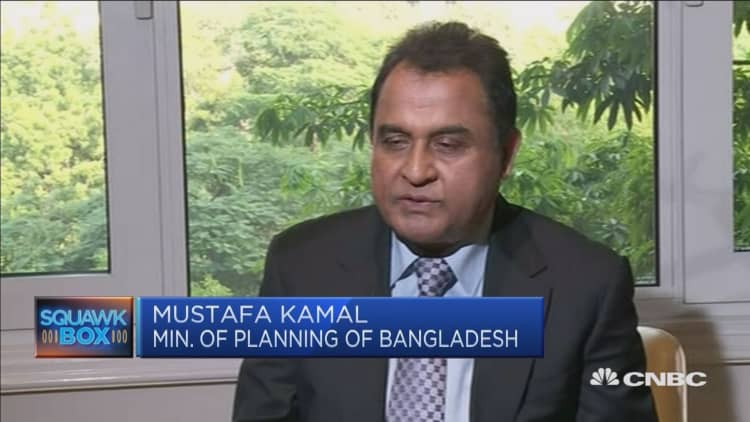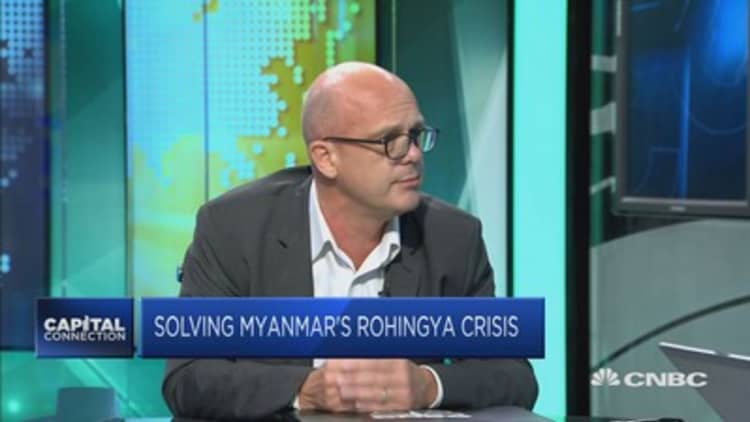The world's second-largest economy raised its hand this week to help halt the ongoing ethnic cleansing in Myanmar. But it's not just altruism: China has an eye on ensuring stability for its hefty investments in the region.
In the wake of rising brutality against Rohingya Muslims, an ethnic minority in Buddhist-majority Myanmar, China proposed a three-point plan to resolve a crisis that threatens to bring a return of U.S. sanctions to the former military dictatorship.
The proposal involves a cease-fire, repatriation of refugees from neighboring Bangladesh and talks for a long-term solution to improve economic prosperity in the northern Burmese state of Rakhine, where the Rohingya are largely based. As one of Myanmar's poorest provinces, Rakhine is also the site of a special economic zone currently being built by a China-led consortium.
Based in Kyaukpyu, one of Rakhine's major towns, the zone includes a $7.3 billion deep sea port, oil and gas pipelines that will run from Rakhine's coast to China's Yunnan province and a $2.3 billion industrial park.
It's not unusual for Beijing to intervene in Burmese domestic affairs — China has previously played a mediating role in Myanmar's Kachin and Shan states, areas also struck by ethnic strife. But the Asian giant's latest diplomatic initiative has a clear business agenda, analysts said.
"It is fair to say that commercial interests are at play, China has significant investments in Rakhine state, the center of the crisis," said Nick Marro, China analyst at The Economist Intelligence Unit.

Covering more than 4,000 acres, the Kyaukpyu special economic zone — a key component of China's Belt and Road infrastructure network — was initially established in 2013 as a joint venture between both governments. The zone's close proximity to the violence in Rakhine, however, has likely worried Chinese officials concerned about potential disruptions to ongoing construction.
"China wants political and economic stability in Myanmar as this is positive for its projects in the country," explained Romain Caillaud, director of Asia Group Advisors, a Southeast Asia-focused advisory firm.
Speaking in the capital city of Naypyidaw on Sunday, Chinese Foreign Minister Wang Yi said Beijing hoped for smooth progress of the peace process "more than any other country," according to an English statement on the foreign ministry website.
Beijing's peace plan certainly reflects a desire for calm in Rakhine in light of its business interests there, echoed Steve Wilford, Asia- Pacific director for global risk analysis at consultancy Control Risks.
But it will be difficult to implement in real terms. Rohingya are not considered real citizens by the central government and military, which still wields enormous power in the former pariah state, with strong anti-Muslim sentiment exacerbating the issue.
Stringent government controls over the population, which include restricted access to health care, education and general movement, constitute "a dehumanizing system of apartheid," Amnesty International said in a Tuesday report, adding to explosive criticism of de-facto leader Aung San Suu Kyi for failing to halt human rights abuses.
Like China, Washington also advocates the return of refugees from Bangladesh back to Myanmar, but many fear that without a change in status, the Rohingya will remain subject to persecution. Secretary of State Rex Tillerson, who visited the Southeast Asian nation last week, has joined the United Nations in saying that ongoing atrocities against the Rohingya amounted to "ethnic cleansing."
Unlike Myanmar's numerous other conflict regions — such as Kachin, where Nobel Peace Prize laureate Suu Kyi has an ongoing diplomatic process with military support — the unrecognized position of Rohingya prevents her from doing the same in Rakhine, Wilford explained.
China's three-staged scheme, which is very similar to solutions proposed by the broader international community, has already been accepted by Myanmar and Bangladesh, according to a Chinese Foreign Ministry spokesman.
In the past, Chinese President Xi Jinping's administration has largely executed peacekeeping efforts in regions that affect its national interests, but the country has increasingly shown a willingness to engage elsewhere, said Marro: "Recently, Beijing offered to mediate between Israel and Palestine, as well as in Syria, where it has fewer commercial interests, if any."
Still, it's unlikely China will become an international peacemaker for purely altruistic reasons, he added.
WATCH: Myanmar faces many internal conflicts apart from the Ryhingya


